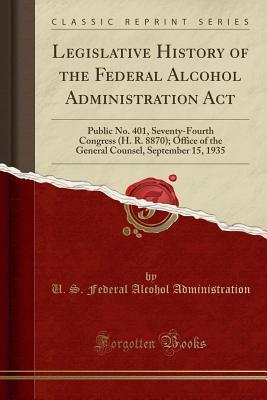Read Legislative History of the Federal Alcohol Administration ACT: Public No. 401, Seventy-Fourth Congress (H. R. 8870); Office of the General Counsel, September 15, 1935 (Classic Reprint) - U S Federal Alcohol Administration | PDF
Related searches:
Federal Legislative History Research U.S. Department of the Interior
Legislative History of the Federal Alcohol Administration ACT: Public No. 401, Seventy-Fourth Congress (H. R. 8870); Office of the General Counsel, September 15, 1935 (Classic Reprint)
The Process - Legislative History Research (Federal) - LibGuides at
The Legislative Process - Federal Legislative History
Researching legislative history - the basics Legal Blog
The Federal Credit Union System: A Legislative History
Legislative History of the Role of the Federal Government in
Index & Legislative History of the UCMJ: Military Legal
A legislative history of a bill is the sequence of steps or path taken to arrive at the final version of the law; the term is also used to refer to the documents reflecting that history.
There are four main types of legislative history documents produced by congress during the legislative process: bills, hearings, reports and debates.
Congress, a bi-cameral legislative body consisting of two chambers, or houses. As shown by its prime spot at the beginning of the constitution.
The legislative history of a particular law consists of all the documents created by the legislature during the process of the law's passage.
As a result of no comprehensive legislation covering disaster relief, congress had to pass a separate law to provide federal funds for each major disaster that occurred. Therefore, acting under this cumbersome system, between 1803 and 1950 congress passed 128 separate laws dealing with disaster relief.
24 mar 2021 research guide from the law library of congress on conducting federal legislative history research.
A legislative history of a bill is the sequence of steps or path taken to arrive at the final version of the law; the term is also used to refer to the documents reflecting that history. Lawyers and other professionals compile legislative histories in order to understand what the legislature intended in authoring the bill, or the purpose and meaning of specific legislative language.
The single most comprehensive database for federal legislative history research.
11,1933-senator sheppard, of texas, introduced three bills designed to set up a federal credit union system.
The legislative history of a particular law consists of all the documents created by the legislature during the process of the law’s passage. This material often becomes valuable later, when disputes arise from vague or ambiguous statutory language.
This webinar will discuss what federal legislative histories are and how they are used, the ways in which federal statutes are published and cited, the normal.
Legislative history includes any of various materials generated in the course of creating legislation, such as committee reports, analysis by legislative counsel, committee hearings, floor debates, and histories of actions taken.
Federal legislative histories are used to aid in determining the intent of congress at the time a statute was planned and enacted or amended.
Buy federal legislative history (westlaw pro™) at legal solutions from thomson reuters.
7 mar 2021 this guide provides an overview of resources for performing federal legislative history research.
8 feb 2021 in general, regulatory intent can be determined from the preambles of a final regulations published in the federal register or a state register.
There are four major sources of federal legislative history: the bills introduced in congress; changes in language and addition or deletion of specific provisions may shed light on the goal trying to be accomplished with the bill. However, this is often considered an insufficient indication of legislative intent.
Essentially, the phrase legislative history refers to the documents created when lawmakers introduce and debate bills as part of the legislative process. For example, federal legislative history may include several different types of congressional documents such as: committee reports; congressional testimony and floor debates; committee hearings; different versions of the bill before it is passed; but why is legislative history important? the answer is very simple.
The richest collection of compiled federal legislative histories available containing nearly 2500 titles from a variety of resources.
Legislative history research refers to efforts to track the progress of a bill through the legislative process and to the examination of documents created through that process. The purpose of conducting such research is to ascertain the legislative intent, that is the purpose for the legislation as intended by congress.
Legislative history research refers to efforts to track the progress of a bill through the legislative process and to the examination of documents created through.

Post Your Comments: